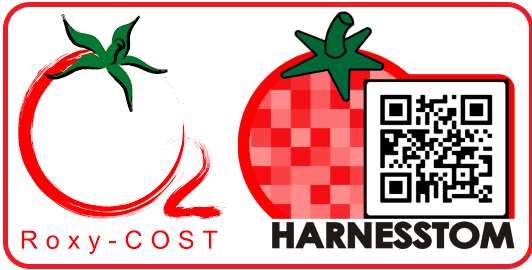STUDIES ON ARABINOGALACTAN PROTEINS (AGPs) AS SIGNIFICANT COMPONENTS OF CELL WALL DURING THE RIPENING PROCESS IN FRUIT
Knowledge of the mechanisms involved in ripening and post-harvest fruit physiology is important for producers and for companies involved in fruit storage. Thus, determination of factors affecting the ripening opens new research avenues for controlling fruit quality. Arabinogalactan proteins (AGPs) are ubiquitous components of the cell wall. According to the latest reports on the cell wall structure model, there is a network of connections between AGP and other basic constituents, including pectins and hemicelluloses, named APAP1. Strikingly, despite the huge interest, no detailed research has been done so far on AGPs found in fruit, and the role, structure, and mechanism of their distribution during fruit ripening are unknown.
General goals of the project: characterization of the occurrence of AGPs in the ripening process in a model organism – tomato (1); analysis of the distribution of AGPs in naturally ripe fruit, in comparison to fruit with altered structure of AGPs (2); elucidation of the AGPs effect on the spatial-temporal localization of other cell wall constituents during ripening process (3); characterization of molecular and structural features of AGPs (4).
Reaching these objectives is linked strongly to creation of interdisciplinary collaboration between the Horticultural Genetics and Biotechnology Department of the Mediterranean Agronomic Institute of Chania (Greece) and the Department of Microstructure and Mechanics of Biomaterials in the Institute of Agrophysics of the Polish Academy of Sciences.
Project is financed by National Science Center Poland (NCN, SONATA16 2020/39/D/NZ9/00232)
![]()
Principal Investigator : Agata Leszczuk (a.leszczuk @ ipan.lublin.pl)
INTER-COST project
 The INTER-COST project "Insight into the transcriptional regulation of the crosstalk between plant hormones and the stress response in fruits" has been successfully accepted and will substantially contribute to the RoxyCOSTproject for the next 3,5 years! This project belongs to Working Group 2 (WG2). “Deciphering the mechanisms of low oxygen sensing in fruit crops”. The aim is to establish a hairy root culture to help with the functional analysis of the candidate genes.
The INTER-COST project "Insight into the transcriptional regulation of the crosstalk between plant hormones and the stress response in fruits" has been successfully accepted and will substantially contribute to the RoxyCOSTproject for the next 3,5 years! This project belongs to Working Group 2 (WG2). “Deciphering the mechanisms of low oxygen sensing in fruit crops”. The aim is to establish a hairy root culture to help with the functional analysis of the candidate genes.
Investigator : Hélène Robert Boisivon (helene.robert.boisivon @ ceitec.muni.cz)
Virtual meeting and ITC conference grant
 We have been made aware by COST Association that the virtual conference fees for ITC conference grants meetings can be considered eligible, if the other eligible criteria are fulfilled.
We have been made aware by COST Association that the virtual conference fees for ITC conference grants meetings can be considered eligible, if the other eligible criteria are fulfilled.
So please do not hesitate to apply even for those if you wish to attend any virtual conference with registration fees.
HARNESSTOM alliance with Roxy-COST action
 The Roxy-COST Action - “Oxygen sensing a novel mean for biology and technology of fruit quality” annual meeting took place in Belgrade from 4-6 Oct, 2022 (https://roxycost.toulouse-inp.eu/en/index.html)( https://www.cost.eu/actions/CA18210/) . The meeting gathered 70 participants from 23 different countries from all over Europe. An excellent opportunity for networking and interaction with the community of researchers interested in tomato ripening, postharvest and plant responses to stress under the common theme of low oxygen participation in those processes. The meeting was a great success given the quality of the scientific presentations and the ideas that emerge during the brainstorming on different sessions /wps-
The Roxy-COST Action - “Oxygen sensing a novel mean for biology and technology of fruit quality” annual meeting took place in Belgrade from 4-6 Oct, 2022 (https://roxycost.toulouse-inp.eu/en/index.html)( https://www.cost.eu/actions/CA18210/) . The meeting gathered 70 participants from 23 different countries from all over Europe. An excellent opportunity for networking and interaction with the community of researchers interested in tomato ripening, postharvest and plant responses to stress under the common theme of low oxygen participation in those processes. The meeting was a great success given the quality of the scientific presentations and the ideas that emerge during the brainstorming on different sessions /wps-
HARNESSTOM was highly represented in the meeting as the institution coordinating Roxy-COST (INPT) is also a partner of HARNESSTOM and HARNESSTOM coordinator is a member of the Management Committee and the Core group of Roxy-COST Action .
As result of this cross-pollination event, Roxy-COST partners agree to collaborate with HARNESSTOM’s in a number of networking and training activities programmed for the coming months. These include (1) the upcoming Training School on “Finding your ideal Tomato “, scheduled for December 2022 and organized by ENEA partner in Rome; (2) the “Phenotyping Training Course and phenotyping Jamboree” (March 2023, organized by UPC, UNITUS and MVCRI to take place at MVCRI in Bulgaria) and (3) the “Second Advanced training School” to take place on Oct 2023 in Israel. In addition to collaboration and co-organization of these training schools, Roxy-COST will allocate STSMs to facilitate participation of Roxy-COST students. HARNESSTOM also will facilitate including data from Roxy-COST partners in the one-stop-shop HARNESSTOM Database and provide access to the HARNESSTOM Gateway of genomic, genetics and phenotypic information and tools.
News for this upcoming events will be advertised and communicated at due time.

